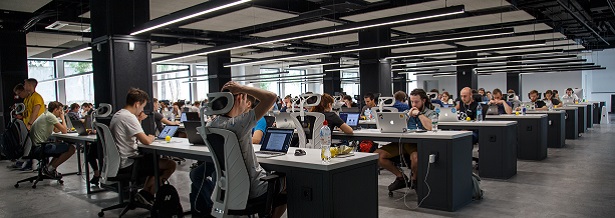In an article in HR Magazine, I talk about how many clichés surround how we discuss the impact of technology on the world of work and on HR.
We hear reports about robots stealing people’s jobs, but we are not seeing a corresponding decrease in employment, so it is more likely that automation is changing the types of work that people are doing, rather than taking away their jobs entirely.
Research in which I have been involved suggests that technology may not be changing the world of work as radically as some might suggest although it does facilitate other changes such as flexible working and contracts that are having a significant impact for HR professionals right now. It is also important to realise that technological advancement is nothing new, as new and emerging technologies have influenced the way that we work since the industrial revolution.
But, regardless of this, we cannot get away from the fact that the workplace is evolving. In my own research, I talk about how the HR function has a huge role to play in supporting employees through all the changes.
Automation
Evidence suggests there are enormous financial incentives for employers to increasingly automate their currently human processes, and that automation is already being used in many areas, including storing or access of information – such as in fraud detection, medical diagnosis or law – and manual tasks – such as driving, cargo handling and mining. It is not yet clear exactly what role HR practitioners will fulfil in relation to increasing automation in the workplace, but it may be that they are best placed to help identify tasks that could be automated. The HR function will also, inevitably, have to help address the impact of job losses resulting from automation. HR professionals will be required to support employees through uncertainty and consider how these employees can be re-skilled or up-skilled in order to allow them to remain in the workforce.
Skills change
Research suggests that – in the years to come – organisations will require increased variety of cognitive, creative, technical and social skills, autonomy and interdependence in order to complement the increase in machines and to perform tasks that are not able to be automated. Certainly, the HR function will have a strong role to play in recruiting and developing these competencies, as well as in designing leadership development programmes suited to the challenges presented by the modern workplace.
Flexible working
As more and more people take advantage of flexible working opportunities created by improved technology and increased employer willingness, HR teams will have a key role to play in managing the policies relating to that, in creating career and performance-management systems that do not disadvantage flexible workers, as well as putting in place initiatives to help combat work intensification as a result.
Remote working
Data suggests that – in most companies – the take-up of home-working has been slow. Nevertheless, the possibilities raised by an increased openness on the part of employers towards remote working has led to a perceived decline in the physical workplace. As employees become increasingly dispersed and virtual systems begin increasingly to replace physical workplaces, the danger is that a lack of face-to-face interactions could lead to difficulties in building effective workplace relationships. With research suggesting social interactions at work help sustain trustful relationships between employees, maintain low stress levels and improve employee performance, as the workplace continues to change, HR professionals will have a role to play in providing opportunities for positive social interactions to occur, in order to combat these potential negatives. For example, some organisations have developed shared spaces where employees can meet to work and interact.
Employment arrangements
As employees explore their options for more flexible working and as employers seek to reduce their costs, there has been a decline in demand for permanent employment and a corresponding upturn in self-employment contracts, subcontracts and various forms of ‘gig-work’. Unfortunately, while providing flexibility, these forms of employment arrangement can also lead to precarious work conditions where employees are unable to influence their working environment and thus feel a lack of connection to their employer, potentially impacting productivity. As the number of alternative employment arrangements continues to grow, the HR function will need to ensure that organisations take a responsible and longer-term approach to using these arrangements, ensuring they do not benefit from the flexibility at the expense of their employees’ need for support and financial security.
Increased connectivity and global working
An increase in global working, along with the potential for a workforce that is increasingly connected and contactable, raises the prospect of work becoming closer and closer to 24/7. In this context, the potential for overworking, stress and burnout increases dramatically. Carrying a large degree of the responsibility for looking after employee well-being, HR professionals will need to have mind to how they can encourage employees to disconnect outside of their working hours. In practice, policies covering such subjects are difficult to enforce, especially when balancing the need for choice of when and where to work.
Technology
Technology is a good thing. It makes people’s jobs and lives easier, it enables us to do more with fewer resources, and it is – very clearly – the future of the workplace. Although its current impact on work may not yet be as severe as feared, anticipated or assumed, nonetheless research suggests that, as the potential benefits and risks of emerging technologies for employees develop, HR’s role may become ever more important. In order to effectively support employees, HR professionals must have the skills and the knowledge of the emerging technologies and understanding of their implications.
It must be remembered that the HR function itself will not be immune from the coming changes to the workplace detailed above. Emerging technologies will influence the approaches that HR professionals take in carrying out their principal functions of attracting, selecting, developing, motivating and retaining talented employees in organisations. An increasing trend towards more flexible working, remote working and different forms of employment arrangements will inevitably impact HR teams too. But by being aware of what is coming, HR teams can ensure they are still in the best place to support those around them in their organisations through the changes to come.
Thinking about the people strategy in your organisation? Find out about our dedicated People Strategy Workshop below.
Read more:





